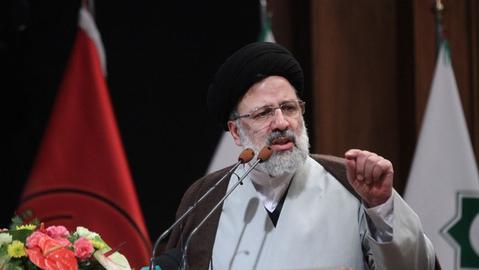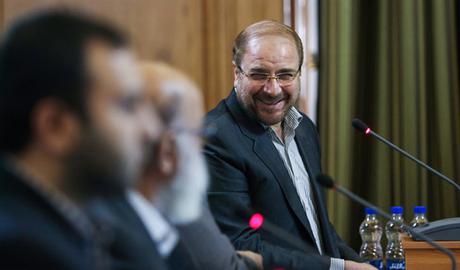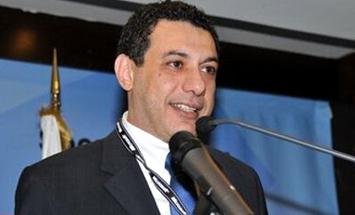With the presidential election just 10 days away, a pattern is starting to emerge: The two main conservative candidates, Ebrahim Raeesi and Mohammad Bagher Ghalibaf, have started to deviate from the traditional characteristics normally attributed to Iran’s hardliner factions. References to “sedition” and the Islamic values of the Republic are out, and appeals to populism and vitriolic attacks on opponents are in.
As Iranian political scientist Mohammad Javad Gholamreza Kashi accurately points out, they no longer seem to care about the Islamic nature of the regime. They do not talk about “sedition” — the favorite word formerly used to attack anyone suspected of dissent or deviance following the disputed 2009 presidential election. Instead, Raeesi and Ghalibaf make populist promises concerning economic development, jobs and living standards.
At the same time, they have re-introduced the major economic promises of the 1979 Islamic Revolution. Recent statements from Raeesi and Ghalibaf strongly resemble Ayatollah Khomeini’s promises immediately following the revolution, including free water, free electricity and free buses.
They are set on accusing President Hassan Rouhani of whatever springs to mind: Corruption, being a lackey of the West, incompetence, stupidity, espionage and so on. So far the only crime they have not accused him of is sexual misconduct.
Not only have Raeesi and Ghalibaf abandoned references to “sedition,” they have changed their narrative in other ways too, abandoning some of Ayatollah Khamenei’s favorite topics of recent years — Iranian-Islamic lifestyle, the resistance economy, fighting western dominance, faithfulness to revolutionary ideals, and so on.
So how did this happen?
First of all, Ebrahim Raeesi, once predicted to be Rouhani’s most serious rival, has not only failed to incite an electoral groundswell, but he has also had difficulty competing with Tehran’s mayor, Mohammad Bagher Ghalibaf, during presidential debates. And although Ghalibaf now has a better chance than Raeesi, he has been unable to achieve the edge that could guarantee him a win in the election. Compared to his performance in the 2013 presidential election, when he lost badly, Ghalibaf has come across much better in debates — even better than Rouhani. But politically, Ghalibaf does not represent any party, and so he has no natural voter base. As a result, he will have to resort to trying to steal votes from other candidates. He will not have an easy time taking them from Raeesi, so he has to try his best to take them from Rouhani, or gain votes from unpredictable sections of the electorate. For the most part, though, his cultural and political differences with these groups makes this aim very difficult to achieve.
Up until now, Ghalibaf’s popularity has peaked at 40 percent. As the principlist activist Mohammad Reza Bahonar has reported, any gains Raeesi has made have been at Ghalibaf’s expense. Raeesi is now his most dangerous rival, and this rivalry looks set to intensify.
Iran’s conservatives have no chance to win overall on May 19. Their only chance for success is to force the election to go to a second round. So both Ghalibaf and Raeesi are doing their best to ensure they will be the one to go head to head with Rouhani. As part of this, they are trying to appeal to voters on populist issues, and for now, paying less attention to upholding the issues most important for the Supreme Leader, or trying to come across as a protector of Islam.
The candidates will also have to keep the memory of the 2013 election firmly in mind. In 2013, Rouhani suddenly went on the attack in the last week of the campaign, and his popularity surged. Ghalibaf and Raeesi will not have forgotten this, and have decided to promise as much as they can, attack as much as they can, and put out as much propaganda as they can in the hope of preventing voters from turning against them in the final week.
For both Ghalibaf and Raeesi, this could be the make-or-break election. Raeesi has the great ambition of succeeding Ayatollah Khamenei as the Supreme Leader, and Ghalibaf is trying his luck for presidency for the third time. His bitter defeat in 2013 means this contest has turned into a mortal combat between Ghalibaf and Rouhani. And there is even speculation that the real competition between Rouhani and Raeesi is actually over who will succeed Ayatollah Khamenei.
But whether these speculations are true or not is not really important. What is key, however, is the fact that the country’s ultra-conservatives have resorted to making unrealistic promises, injecting as much fear and distrust into society as possible, and putting one of the most negative spins on the 38-year history of the the country that one could imagine. It’s so extreme that reformists have taken to defending the achievements of the Islamic Republic and warning their principlist rivals about the dangerous consequences of their unrealistic promises.
It is a topsy-turvy world!
visit the accountability section
In this section of Iran Wire, you can contact the officials and launch your campaign for various problems


























comments